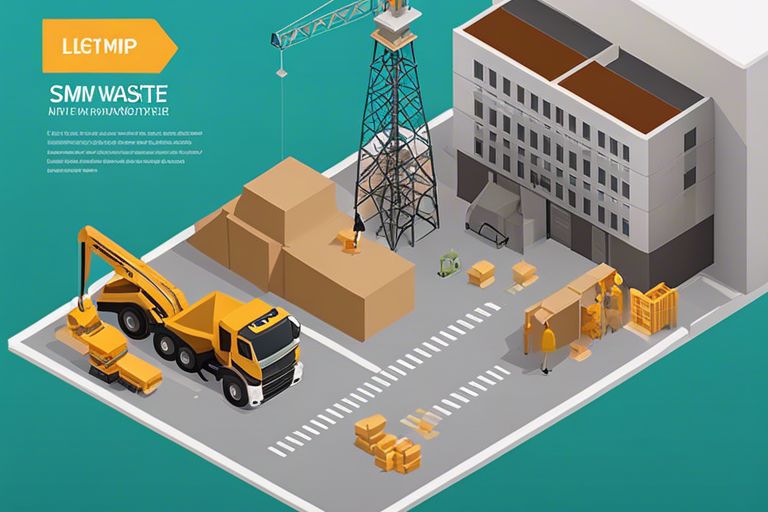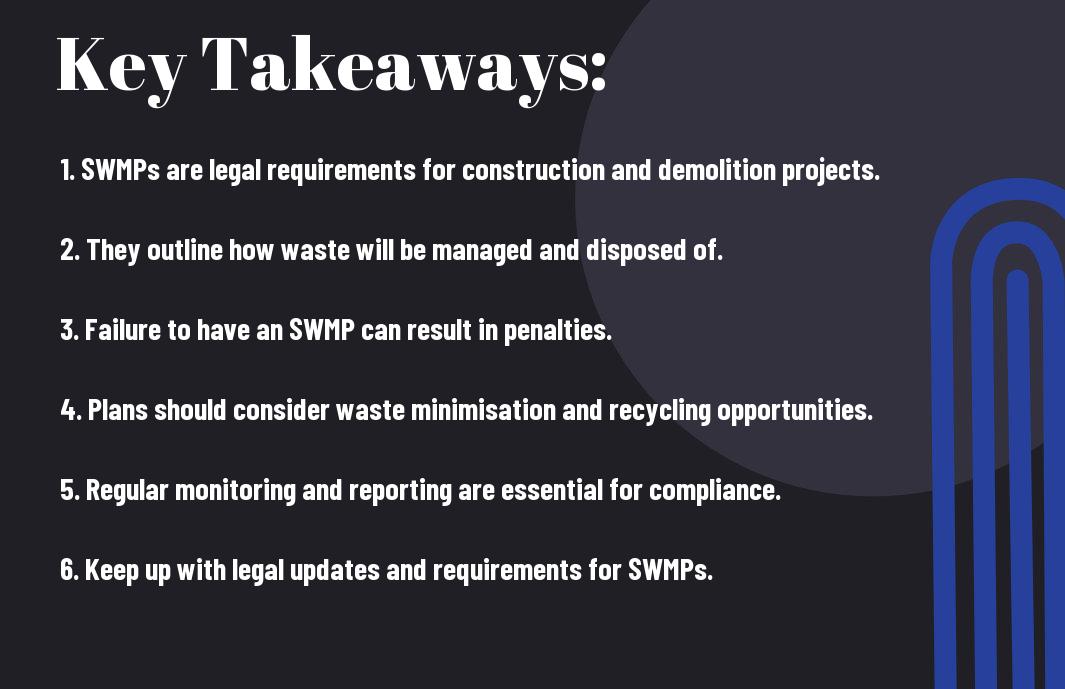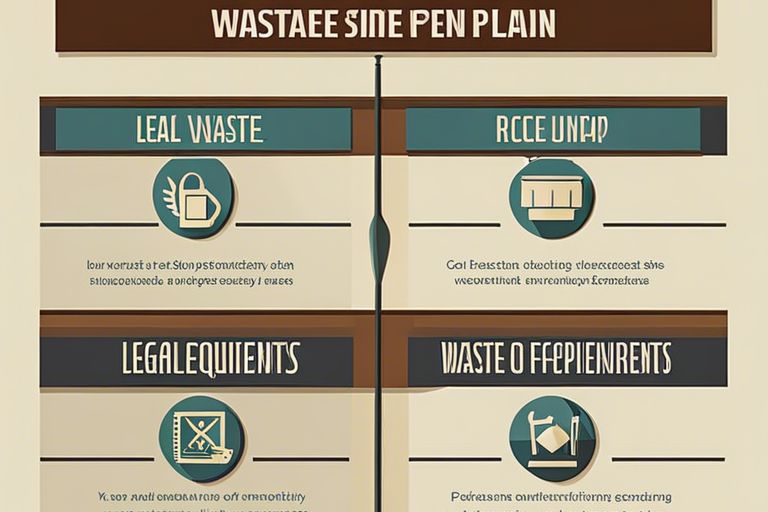Obtaining a comprehensive understanding of the legal requirements surrounding Site Waste Management Plans (SWMP) is crucial for any construction or industrial project. Failure to comply with these legalities can result in hefty fines, legal action, and damage to the environment. This informative blog post aims to provide a clear and concise overview of the legalities surrounding SWMP, including the key regulations and obligations that must be adhered to. We will explore the most important aspects of SWMP, such as the duty of care when handling waste, the importance of accurate record-keeping, and the implications of non-compliance. By the end of this post, readers will have a solid grasp of the legal framework surrounding SWMP, empowering them to make informed decisions and avoid potential risks and liabilities.
Key Takeaways:
- Legal requirements: Site Waste Management Plans (SWMP) are a legal requirement for construction projects in the UK exceeding a certain value, and failure to comply can result in penalties.
- Documentation and monitoring: Proper documentation and monitoring of waste generation, segregation, and disposal are essential components of SWMP to ensure compliance with regulations and to demonstrate responsible waste management practices.
- Environmental responsibility: Implementing an effective SWMP not only ensures compliance with the law but also contributes to environmental sustainability by reducing waste, promoting recycling, and minimising the impact of construction activities on the environment.


Legal Foundations of SWMP
Understanding the legal framework surrounding Site Waste Management Plans (SWMP) is essential for construction project managers and developers. The legislation governing waste management has evolved over time, and compliance with these legal requirements is crucial for environmental and legal reasons.
Historical Development and Legislation
The concept of waste management has been addressed in various forms of legislation over the years. The Environmental Protection Act 1990 was a significant milestone in the UK, as it outlined the duty of care for waste and empowered authorities to regulate and enforce waste management. This was further reinforced by the introduction of the Waste Management Licensing Regulations, which aimed to control the disposal, treatment, and storage of waste.
Current Legal Requirements and Enforcement
Currently, the legal framework for SWMP is governed by the Environmental Protection Act 1990, the Waste (England and Wales) Regulations 2011, and the Construction (Design and Management) Regulations 2015. These regulations include specific requirements for the production and implementation of SWMP, as well as enforcement measures to ensure compliance. Local authorities and environmental agencies have the authority to inspect construction sites and take enforcement action against non-compliant parties.
It is crucial for construction professionals to be aware of and adhere to the current legal requirements for SWMP in order to avoid hefty fines and legal consequences. Non-compliance with these regulations can result in significant environmental harm, legal liabilities, and reputational damage for individuals and organisations involved in construction projects.

Components and Structure of SWMP
The Site Waste Management Plan (SWMP) is a crucial document that outlines the management of construction site waste. It is composed of several components and follows a specific structure to ensure efficient waste management throughout the project.
Identifying Waste Types and Sources
One of the key components of SWMP is the identification of waste types and sources. This involves conducting a thorough assessment of the various types of waste generated on the construction site, including but not limited to, concrete, wood, metal, and plastics. The sources of waste, such as demolition, excavation, or packaging, must also be clearly identified. This information is crucial for developing appropriate waste management strategies and ensuring compliance with waste regulations and legislation.
- Concrete
- Wood
- Metal
- Plastics
- Demolition, excavation, packaging
Thoroughly understanding the types and sources of waste is essential for developing effective waste management plans. Through this process, it becomes possible to accurately estimate the volume and nature of waste that needs to be managed and disposed of, thus reducing the risk of environmental hazards and legal penalties.
Waste Hierarchy and Management Strategies
A crucial element of SWMP is the integration of waste hierarchy principles and the development of management strategies to address the identified waste types. Waste hierarchy prioritises prevention, minimisation, reuse, recycling, and energy recovery, in that order, before considering disposal as a last resort. Management strategies must align with these principles, ensuring that environmental impact is minimised and valuable resources are utilised efficiently. This comprehensive approach is essential for achieving sustainable waste management outcomes.
When developing waste management strategies within SWMP, it is important to consider the potential positive and negative impact of each option on the environment, as well as the financial and legal implications. Implementing best practice waste management strategies not only benefits the environment but also demonstrates compliance with waste legislation, safeguarding the project from potential penalties and reputational damage.
Implementation and Compliance
When it comes to implementing Site Waste Management Plans (SWMPs), it is crucial to ensure compliance with the legal requirements. Companies and individuals involved in construction projects must adhere to the regulations set out in the Environmental Protection Act 1990 and the Site Waste Management Plans Regulations 2008. Failure to comply can result in severe penalties and legal consequences.
To understand the legalities and best practices surrounding SWMPs, it is essential to consult resources such as the Site Waste Management Plan- The essential guide to SWMPs. This comprehensive guide provides valuable insights into creating, implementing, and complying with SWMPs, helping businesses and individuals navigate the complex legal landscape.
Roles and Responsibilities
When it comes to SWMP implementation, clear roles and responsibilities must be established within the project team. The project manager, site supervisor, and waste management coordinator play crucial roles in ensuring that the SWMP is effectively executed. Clear communication and accountability are essential to ensure compliance and mitigate any potential legal risks.
Additionally, all individuals involved in the construction project must be aware of their responsibilities in relation to waste management. This includes the segregation, storage, and disposal of waste materials in accordance with the SWMP and relevant legislation.
Monitoring, Reporting, and Auditing Procedures
Monitoring, reporting, and auditing procedures are vital components of SWMP implementation. Regular monitoring of waste generation, segregation, and disposal practices is necessary to identify any non-compliance issues and take corrective action. Reporting mechanisms must be in place to document the quantity and types of waste generated and disposed of during the project lifecycle.
Auditing procedures are essential to verify compliance with the SWMP and identify any areas for improvement. Regular audits help to demonstrate a commitment to legal compliance and environmental best practices, while also providing valuable data for future projects and continuous improvement initiatives.
Effective monitoring, reporting, and auditing procedures are crucial for maintaining legal compliance, promoting sustainability, and enhancing the overall waste management practices within the construction industry.
Challenges and Best Practices
When it comes to Site Waste Management Plans (SWMP), there are several challenges that construction companies and project managers face. However, with the implementation of best practices, these challenges can be effectively addressed and mitigated.
Common Challenges in SWMP Execution
One of the most common challenges in the execution of SWMP is the lack of understanding and awareness among site workers and subcontractors. This often leads to improper waste segregation and disposal, resulting in non-compliance with regulations and environmental damage. Additionally, ineffective communication and coordination between different stakeholders can hinder the successful implementation of SWMP.
Case Studies and Effective Solutions
Several case studies have highlighted the effectiveness of implementing comprehensive training programmes for site workers and subcontractors. By providing them with the necessary knowledge and resources, construction companies have successfully improved waste segregation and disposal practices on-site. Additionally, the introduction of digital tools and software for tracking and monitoring waste management activities has proven to be an effective solution in ensuring compliance and accountability.
- Case Study 1: A construction company in London implemented a comprehensive training programme for its site workers, resulting in a 30% reduction in waste sent to landfill.
- Case Study 2: A development project in Manchester adopted digital waste management software, leading to a 20% increase in recycling rates and a 40% decrease in waste disposal costs.
Effective solutions such as targeted training programmes and the adoption of digital waste management tools have proven to be instrumental in addressing the common challenges faced in SWMP execution. By learning from successful case studies and implementing best practices, construction companies can ensure the effective management of site waste while staying compliant with regulations.
Understanding the Legalities of Site Waste Management Plans (SWMP)
It is crucial for construction companies and project managers to have a comprehensive understanding of the legalities surrounding Site Waste Management Plans (SWMP) in order to comply with regulations and avoid potential penalties. A well-structured and compliant SWMP not only ensures environmental responsibility but also promotes efficient resource management. By familiarising themselves with the legal requirements and best practices of SWMP, companies can ensure smooth project execution while minimising the impact on the environment. For more detailed information on SWMP and its importance, visit Site Waste Management Plans (SWMP) And Why You ….
Site Waste Management Plans (SWMP) FAQs
Q: What is a Site Waste Management Plan (SWMP)?
A: A Site Waste Management Plan (SWMP) is a document that provides a systematic approach to managing waste on construction sites, including the types of waste produced, how it will be managed, and who is responsible.
Q: Why are Site Waste Management Plans (SWMPs) important?
A: SWMPs are important for monitoring and controlling construction site waste, ensuring compliance with environmental regulations, and promoting sustainable waste management practices.
Q: Who is responsible for creating and implementing a Site Waste Management Plan (SWMP)?
A: The principal contractor or the person in control of the construction site is responsible for creating and implementing an SWMP in accordance with the legal requirements.
Q: What are the legal requirements for Site Waste Management Plans (SWMPs)?
A: In the UK, construction projects exceeding a certain threshold are legally required to have an SWMP in place. The legal requirements are outlined in the Site Waste Management Plans Regulations 2008.
Q: What are the consequences of not complying with the legalities of Site Waste Management Plans (SWMPs)?
A: Non-compliance with SWMP regulations can result in penalties, fines, and legal action. It can also damage the reputation of the construction company and harm the environment through improper waste management practices.







